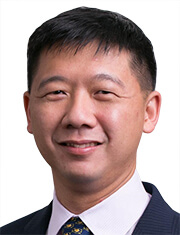Profile

Dr Yih Yng NG
Co-Principal Investigator
Dr Yih Yng Ng is a Senior Consultant in the Department of Preventive and Population Medicine at Tan Tock Seng Hospital, Deputy Clinical Director and Director of the Digital and Smart Health Office at the Ng Teng Fong Centre for Healthcare Innovation. He is an Associate Professor of Digital Health at the Lee Kong Chian School of Medicine NTU and an Adjunct Assistant Professor at the Duke-NUS School of Medicine as a faculty of the Pre-hospital Emergency Research Centre and Saw Swee Hock School of Public Health (NUS).
He has a deep professional interest in the use of digital means to enact better public health policy, improve community healthcare and network health services to empower citizens to make better healthcare choices. He has a track record of using public health and business administration skills to solve large and unstructured problems. He has extensive experience in innovation, strategic planning, policy design and operations in the Singapore Armed Forces, Ministry of Health Singapore, Ministry of Home Affairs and the Singapore Civil Defence Force with a good understanding of health IT systems.
At Tan Tock Seng Hospital he has taken up the role of Director of the Digital and Smart Health Office (DSHO) of the Central Health region to develop a digitalisation strategy and coordinate cross-cutting digitalisation efforts at TTSH and beyond. As a former military emergency physician, he has broad experiences in public health, emergency medicine, epidemiology, health services management and operations over the last 25 years. He has authored over 70 peer-reviewed articles on EMS, resuscitation, CPR, dispatch and public health and has an academic interest in EMS, resuscitation, mobile Health Information Technology & Public Health as an adjunct assistant professor of the Lee Kong Chian School of Medicine, the Duke-NUS school of medicine as a faculty of the Pre-hospital Emergency Research Centre and Saw Swee Hock School of Public Health.
Singapore - NUS
Researchers
HD4
Research Interest
- Cardiac arrest
- Emergency medical services
- Digital health
- AI
- Public health systems
Key Publications
Google Scholar Link
A. F. Ho et al., “The relationship between ambient air pollution and acute ischemic stroke: A time-stratified case-crossover study in a city-state with seasonal exposure to the Southeast Asian haze problem,” Annals of Emergency Medicine, vol. 72, no. 5, pp.591–601, 2018. doi: 10.1016/j.annemergmed.2018.06.037.
Ho et al., “The relationship between air pollution and all-cause mortality in Singapore,” Atmosphere, vol. 11, no. 1, p. 9, 2019. doi: 10.3390/atmos11010009.
A. F. W. Ho et al., “Long term survival and disease burden from out-of-hospital cardiac arrest in Singapore: A population-based cohort study,” The Lancet Regional Health - Western Pacific, vol. 32, p. 100 672, 2023. doi: 10.1016/j.lanwpc.2022.100672.
N. S. You, H. J. Shun, Y. Yong and N. Yng, “Factors influencing success and safety of AED retrieval in out of hospital cardiac arrests in Singapore,” The Korean Journal of Emergency Medical Services, vol. 26, no. 2, pp. 97–111, 2022. doi: 10.14408/KJEMS.2022.26.2.097.
Achievements
Dr Ng restructured the Singapore Armed Forces emergency medical centre care infrastructure model and enhanced the clinical auditing systems for over 35 medical centres. He restructured the entire medical department at the Singapore Civil Defence Force, transforming the 995 call centre’s medical capabilities to provide dispatch life support and starting 100% critical call taking feedback, revamping the EMS model of care into an integrated fire and EMS operational response model and redesigning the national paramedic education system. This was rolled out by the Singapore Armed Forces and Singapore Civil Defence Force with Nanyang Polytechnic and UniSIM. At the Ministry of Home Affairs he crafted a new HomeTeam Medical Services Division to aggregate common healthcare services and medical logistics, and developed medical contingency plans and policies to standardise health protection to optimise occupational health and safety.
